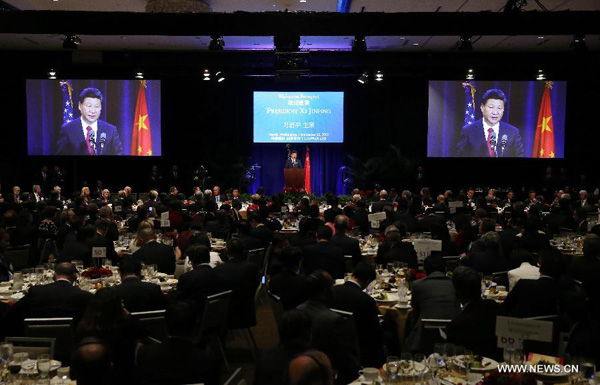
Chinese President Xi Jinping (C) delivers a speech during a welcome banquet jointly hosted by Washington State government and friendly communities in Seattle, the United States, Sept. 22, 2015. Xi arrived in this east Pacific coast city on Tuesday morning for his first state visit to the U.S. (Xinhua)
In 1985, Xi Jinping visited the heartland state of Iowa and left with wonderful impressions of the warmth and hospitality of Midwestern farmers. He returned again to Iowa in 2012. Thirty years after President Xi's first visit to the United States as a local Party chief in Hebei Province, he now returns to America as leader of the world's second largest economy and a major global power. Xi is visiting Seattle to meet with business leaders before being officially received at the White House, and then goes on to New York to address the United Nations. [Special coverage]
In Seattle, Xi delivered a policy speech warning of the risk of strategic miscalculation among major powers and the disaster that would come from conflict between the United States and China. Instead, he suggested potential "win-win" opportunities in clean energy, law enforcement, military-to-military exchanges, and people-to-people relations.
During his official state visit on September 25, 2015, Xi will reiterate his call for a "new model of major country relations" with President Barack Obama, and both leaders will seek to fortify the relationship on issues of climate change, financial stability, economic growth, and global governance. Already, the possibility of a bilateral investment treaty (BIT) is tantalizing and could be concluded during the trip.
However, this meeting will also include topics of serious dispute that challenge the bilateral relationship. Serious friction in Sino-American relations are growing, and the noise will grow louder with an approaching American election and presidential candidates competing to criticize China on all sorts of issues.
Formal discussions between the two countries will cover cyber-security concerns on both sides and competing visions of security and international law in the South China Sea. This gathering will likely reiterate both countries' positions on these issues and be similar to the numerous such meetings over the past two decades.
Since the landmark opening of relations following the meetings of Mao Zedong and Richard Nixon and then Deng Xiaoping and Jimmy Carter, U.S.-China relations have become regular and routine, but as China has risen in global prominence, the nature of high-level dialogue has not kept pace. China is not a member of the G7 and its economic growth has not been accommodated in international organizations such as the World Bank and International Monetary Fund. At the UN Security Council, China's voice does not always get equal respect among the permanent five when decisions of sanctions, intervention, and war are discussed. Meanwhile, China's domestic policies are subject to unceasing and withering criticism from many Western voices.
But much has changed. In foreign relations, Xi has begun to assert China's national interests more confidently as would befit a major world power. Most notably, China has launched its "Belt and Road" initiative offering a rebalancing of global economic relations, and in particular the formation of the Asian Infrastructure Investment Bank (AIIB) may become an alternative model to the aforementioned Bretton Woods regime of the American-preferred neoliberalism, instead providing a state-led program of government directed industrial policy. The United States opted not to join, and has been left on the outside looking in, likely regretting this decision based on Treasury Secretary Jack Lew's subsequent comments that warmed to the idea of the AIIB.
Now is the time to elevate this bilateral relationship to a new level of interaction and exchange. The United States should boldly resuscitate the notion of a G2 relationship and focus on the strategic and economic importance of more intimate dialogue regarding international affairs. Thus, Obama should accept Xi's vision of a new model for the relationship, an area that Xi highlighted in Seattle through forums like the Asia Pacific Economic Cooperation (APEC), the U.N., and the G20.
Now is the time to embrace the most important bilateral relationship in the world, and the United States should welcome Xi's suggestion of a new model, one of parity and mutual respect.
If China is ready to become a global stakeholder, the G2 moment may have returned, and the timing is right for Obama to make a bold entreaty that formally recognizes China's enormous global footprint.
After strong foreign policy achievements in opening relations to Cuba and reaching compromise with Iran over its nuclear program, elevating U.S.-China relations would be timely and fitting.
Let's hope that both sides realize the historical importance of Xi's first state visit to the United States and perhaps last during the Obama presidency. In Xi's words, "disagreements are a reality" but they must be managed with respect by seeking "common ground."
The author, James DeShaw Rae, is an associate professor in the Department of Government at California State University, Sacramento, and a Fulbright Scholar (2011-2012) at China Foreign Affairs University.


















































